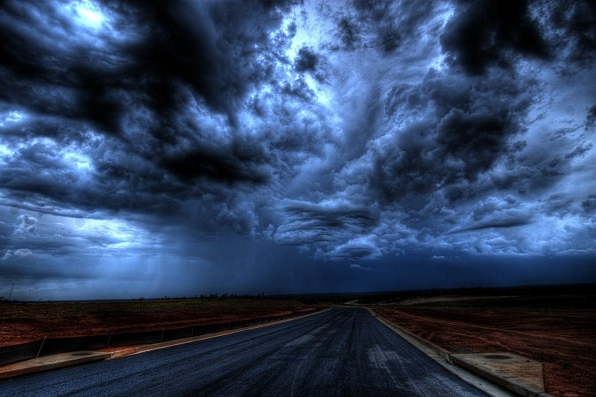Editor’s note: The following is extracted from Sermons, by Rev. William G. Neville (published 1908).
“We have made lies our refuge.” — Isaiah xxviii. 15.
The Bible gives us spiritual knowledge and information not only concerning the things of this world, but it has raised the veil of futurity and enlightened us on some of the things which are to transpire in the world to come. It tells us of a general judgment day, when God shall judge the whole world of mankind by his Son, Jesus Christ, according to the principles of His inflexible justice. It tells us of two places, and only two, in the future world, to which the souls of all mankind will be assigned on the general judgment day. One of these places is filled with inexpressible joy and happiness; the other with inexpressible pain and sorrow. Heaven is a place of love and purity and blessedness; hell is a place of strife and anger and intense suffering. These two places shall possess these characteristics forever; and there shall be no passing from one place to the other.
The Bible also informs us that, in a state of nature, we are not prepared for heaven; it tells us that we are not prepared to meet God, the great Judge of the uni verse. And our own hearts corroborate the testimony of Scripture on this point. We know that we need something, in addition to what we already have, to sup port us when we take our departure out of this world. When we come to the threshold of the unseen world, every human support gives away. Our friends and companions can go to the gate of death with us; but they can go no farther. After that point, we must travel alone, as far as any human society is concerned. This idea necessarily throws around death a solemnity which few other subjects possess. The most frivolous and light-hearted, when brought face to face with death, are made to have serious thoughts and reflections.
Why is it that there is a natural dread in the heart of man against death? It is because he is a sinner and is not prepared to meet his God; it is because he knows he will meet the condemnation of a righteous Judge; it is because he knows that, unless his heart has been changed, he will hear the solemn sentence justly pronounced against him and all his class: “Depart from me, ye cursed, into everlasting fire, prepared for the devil and his angels.” Ah! the soul of man needs something to lean upon as it marches through the valley of the shadow of death and as it goes up to the judgment seat of Christ. When the storm of God’s wrath gathers over a wicked world, the soul will need something to hide under. What will become of the soul that is exposed to this furious storm?
“How will my heart endure
The terrors of that day,
When earth and heaven, before his face,
Astonished, shrink away.”
This great subject has made an impression on all mankind. Even the wicked are anticipating the stern realities of the future world. Most of them will tell you that they have a hope of the eternal salvation of their souls. But, alas! alas! how often is it the case that this hope is a false hope, grounded on false principles! It is amazing and alarming upon what weak and tottering foundations some men will rest the salvation of their immortal souls. How many there are who have made lies their refuge, and under falsehood have hid themselves! And in such refuges as these they imagine themselves to be secure.
Are there any here to-day who have made lies their refuge? Are there any here who are hiding themselves under falsehood? I call upon each one of you to examine your refuge and see whether, in the light of God’s Word, it is secure or not. Upon what is your hope of salvation and heaven built? In view of the stern and awful realities of the future world, to which you are rapidly hastening, it becomes you to prepare for these realities. Stop, my friend, and take your bearings.
It will be my purpose on this occasion to notice a few of the lies which men have made their refuge; and the first refuge of lies which I shall bring to your attention, is:
I. The Refuge of Universalism. This refuge which men have made is sufficient, they think, to secure the salvation of the whole human race. There is no one op posed to the doctrine of eternal happiness in the world to come. It is the doctrine of eternal punishment that clashes with the carnal mind and the wicked heart. All men are willing to be saved — some on their own terms ; none are willing to be damned. But there are a great many who want to be saved in their own way. So they have destroyed, in their wicked imaginations, the doctrine of eternal punishment, and have given to the world what they call a universal salvation, which saves every man. They take refuge in what they imagine to be God’s goodness and benevolence. They maintain that God is too good and benevolent a Being to punish his creatures, or to see them suffer. They say those pas sages of Scripture which seem to teach the doctrine of future punishment are mere figurative expressions, and that really there is no such doctrine taught in the Bible. These men have made lies their refuge, and the very first stroke of God’s hand of justice will demolish forever this refuge of lies in which they think themselves secure. It is amazing how men will rest undisturbed in their carnal security, when such momentous interests are at stake.
The whole human race is tainted more or less with the doctrine of universalism. Or, at least, every man consoles himself with the idea that he is going to be saved, it matters not what he does. Even though he may be living in open rebellion against God, yet he eases his conscience with the delusive hope that he is not going to be lost. If you could take the census of this community on this subject, I expect you would find that every one expects to be saved. No one would have it down on his programme to be lost. And yet there are doubtless scores here who will be lost.
Now, my friends, the Word of God and the Providence of God are plain and explicit in denouncing this doctrine of universalism as a refuge of lies.
Let us hear what God’s Word has to say on this subject. Psalm ix. 17, says: “The wicked shall be turned into hell, and all the nations that forget God.” Again, Christ informs us, in Matthew xxv. 41, that He shall say to the wicked, and to those who have refused to be his disciples, on the last great day: “Depart from me, ye cursed, into everlasting fire prepared for the devil and his angels.” Again, Christ says in Matthew xxv. 46: “And these (i.e., the wicked) shall go away into everlasting punishment: but the righteous into life eternal.” Again, Christ says, in Mark ix. 43-4: “If thy hand offend thee cut it off: it is better for thee to enter into life maimed, than having two hands to go into hell, into the fire that never shall be quenched: where their worm dieth not and the fire is not quenched.” Again, Christ says in the parable of the rich man and Lazarus, in the sixteenth chapter of Luke: “The rich man also died and was buried: and in hell he lifted up his eyes, being in torments, and seeth Abraham afar off and Lazarus in his bosom. And he cried and said, Father Abraham, have mercy on me, and send Lazarus, that he may dip the tip of his finger in water and cool my tongue: for I am tormented in this flame. But Abraham said, Son, remember that thou in thy lifetime received thy good things and likewise Lazarus evil things: but now he is comforted, and thou art tormented. And beside all this, be tween us and you there is a great gulf fixed: so that they which would pass from hence to you cannot: neither can they pass to us, that would come from thence.”
Now, my friends, if language has any meaning at all, these passages from God’s Word teach: 1. That there is such a place as hell; 2. That this place was prepared for the wicked; 3. The rejecters of Christ will be consigned to this place; 4. That the sufferings of those who go to this place will be unending, for the very same adjective in the original Greek which is used to express the duration of heaven, is also used to express the duration of hell. If heaven is an eternal place, so is hell. If the Bible teaches anything, it teaches the doctrine of future and eternal punishment. If this doctrine falls to the ground, the Bible must go with it.
But I would also point those who say God is too good to punish His creatures to the providence of God; and I would ask them if they can find any support here for their refuge of lies. Take the case of the flood, where God punishes the whole human race, with the exception of eight souls. And how does He punish them? He destroys their lives by sweeping them from off the face of the earth. Take the cities of the plain, and what does the record say God did with them? The Bible says: “Then the Lord rained upon Sodom and upon Gomorrah brimstone and fire from the Lord out of heaven: and he overthrew those cities, and all the plain, and all the inhabitants of the cities, and that which grew upon the ground.”
Take one more example in the providence of God, which ought to remove all doubts and stop all cavillings respecting the doctrine of future punishment. I refer to the crucifixion of Christ. Go visit the Saviour in the garden, where he was anticipating the sufferings of the cross. He says: “My soul is exceeding sorrowful, even unto death.” “And he went a little farther, and fell on his face, and prayed, saying, O my Father, if it be possible, let this cup pass from me.” Then follow the Saviour to Calvary, where he pours out his life-blood upon the cross and gives up the ghost. And remember that all this was done by the determinate counsel and foreknowledge of God. Now, here is the argument: If God would punish an innocent being, who did no sin, but was merely a substitute of the sinner: yea, if God would punish his only begotten and well-beloved Son, who was eternally the brightness of his glory and the express image of his Person, with such a violent death as that upon the cross, do you think he will be too good to punish the wicked, who have defied the living God and would none of his reproof? “The way of the transgressor is hard.” This is the law of God Almighty as seen in this life; it is only a prophecy of what it will be in the life to come. “Be not deceived; God is not mocked, for whatsoever a man soweth that shall he also reap.”
The universalist has made lies his refuge, and under falsehood he is trying to hide himself. The very nature of God demands that he punish sin. God cannot permit sin to go unpunished without subverting the very principle upon which his moral kingdom is built. It will be unfortunate, indeed, for that man’s soul who waits till the judgment day to find out that universalism is a refuge of lies.
II. Another refuge of lies which men have made is their morality. Let it be understood, once for all, that I am not speaking against morality as a system by which to regulate our conduct. The Bible enforces morality. It is impossible to please God without a sound, healthy morality. But I am speaking against men making morality the foundation of their hopes of salvation and heaven. Morality is a good thing in its place; yea, an indispensable thing, in its place. But, as a ground of our justification in the sight of God, it is a refuge of lies. Yet, there are thousands of souls resting in this delusion. They imagine that they are going to be saved, because they have been good citizens, good neighbors and honest men. They have been kind and benevolent, and have contributed to the support of charitable institutions. Perhaps they will tell you that they have no fears of death. They will tell you that they expect to be saved in heaven with God’s people. And upon what is their hope of heaven grounded? Upon their morality. I tell you, my friends, that is a refuge of lies. These men are expecting to do something which no man has ever done and which no man can possibly do — reach heaven without Christ. There is no Christ in the gospel of the moralist, and yet he expects to reach heaven, when the Word of God distinctly tells us that there is no other name under heaven given among men whereby we must be saved.
Yea, the moralist would seem to force his way into heaven in spite of God. He admits that God has directed us how to be saved — by Jesus Christ his Son ; but he says by his actions that he is going to run an independent schedule in his salvation. What does he care about Christ as a Saviour? What does he care about an atonement for sin? What does he care about the work of the Holy Spirit? What does he care about the doctrines of regeneration, justification and sanctification? What does he care about the church of God?
My friends, if a man can be saved by his morality, the whole plan of salvation, as found in the gospel of Christ, is a consummate farce. If a man can be saved by his morality, God made one of the most egregious errors on record when he sent his Son into the world to die that men through his death might be saved. If man can be saved by his morality, the Bible is a pack of lies, and, instead of commanding our respect, ought to be committed to the flames. If man can be saved by his morality, Socrates and Confucius are far better teachers than Christ, for he tells us that without him we can do nothing. But rest assured, my hearer, that no man shall ever enter heaven by his morality. Some men may be satisfied with morality as a sufficient reason why they should be saved; but this will never satisfy God, and he is to be the Judge. When the moralist comes up to the threshold of heaven, he will be abashed and confounded, when he sees written over its portals: “And there shall in no wise enter into it anything that defileth, neither whatsoever worketh abomination, or maketh a lie: but they which are written in the Lamb’s book of life.” But he goes on and knocks at the door for admittance. He is asked upon what ground he desires to be admitted. He answers, “Upon the ground of my morality.” The porter refuses to let him in, because it is written, None shall obtain admittance here except those whose names are written in the Lamb’s book of life. The moralist appeals to God for admittance. He says: “I was a good citizen in the other world; I lived an honest and honorable life; and I fully expected my morality to save me. I made no other preparation; this was the refuge of my soul.” God shall say to him: “Did I not give you my Word to read? Did this Word not tell you that all men were sinners by nature and by practice, and that the wages of sin is death? Did this Word not tell you that by the deeds of the law no man living should be justified? Further, did this Word not tell you that the blood of Jesus Christ, my Son, cleanseth from all sin? Did this Word not tell you to believe in the Lord Jesus Christ, promising you salvation upon the ground of your faith in him? Did this Word not also tell you that he that believeth not shall be damned? And here you are, wanting to share in the glories and blessings of Christ’s kingdom, when, in the other world, you spurned the offers of his gospel and turned your back upon his church. Here you are wanting me to violate my sacred oath and contradict my solemn word. I am God, infinite, eternal and unchangeable in my truth and justice; you cannot enter these portals. ‘Depart from me, ye cursed, into ever lasting fire, prepared for the devil and his angels.’ ” O what a complete and disastrous wreck the refuge of the moralist will be when the storm of God’s wrath and judgment is poured upon it!
III. Another refuge of lies in which millions of souls are resting is procrastination. They will tell you that they expect sometime to attend to the subject of their soul’s salvation. They think there is plenty of time yet. They expect to do great things — in the future, but it is always in the future. And their salvation will always be in the future, for God will sweep them away in their presumption and procrastination.
I have read an allegory which forcibly illustrates the spiritual condition of a vast multitude of the human race. “One evening,” says the allegory, “a young man was sitting in his cottage, talking with his wife as to their future. He was poor as to money, but had the wealth of a good and strong constitution, and able and willing hands to work. He was blest with a good mind and full of energy and industry. Sitting in his lap was a little son, who had not numbered his first twelve months. The young mother was busy with her needle. Just then was heard a knock at the door, and a cordial invitation given to come in. A neighbor, thought the young couple. But much to their alarm, in walked Death. Fixing his eyes upon the young man, he said in an authoritative manner : ‘Young man, I have come for you and shall make you a citizen of my silent kingdom.’ ‘Have mercy!’ exclaimed the young man. ‘You have mistaken the house; you certainly must have come for my old rich neighbor.’ ‘I make no mistakes; I came for you; I respect neither age, circumstance, nor condition. Come, go.” Said the young man in the terror of despair: ‘Let me reason with you! Let me plead my case! Hear my petition for a longer life!’ Death said: ‘Speak on and let me hear your case. I do sometimes relent for a season, at least.’ The young man said: ‘In the first place, I think you have come too soon for me. I have just started life; and there you see my young wife, and here in my lap our little babe. Would you make her a widow so soon, and my child fatherless? Who will take care of them if you take me away? Besides, here is my little home I have just bought. My prospects in life are fair and inviting. Would you blight all in a moment? Let me live to mature my plans, and see my boy grow up to man’s estate, so that he will be able to take care of his mother. And the last reason I have is this: I have not made that preparation I should have made for so important a journey as you would send me on. I have neglected my soul’s highest welfare in thinking of my temporal affairs. I am not prepared to meet my God.’ Death arose from his seat and said: ‘Young man, you have stated your case and condition fairly and with good reasons; I will leave this time without you; but mark me well, I will return at some future day, but will hear no reasons — you must go then. Before I come again, I will send you three messengers; each will tell you I am coming — take care that you heed them.’ ‘I will,’ exclaimed the young man, and thank you for your kindness in now going and your generous consideration in sending me notice.’ Time rolled on. The young man grew to middle age; and soon old age came upon him. His life had been a success, so far as this world was concerned. Affluence and children had blessed his declining years. One pleasant evening, sitting at his ease and comfort in his elegant home, with a little grandson playing about him, he heard a ring at the door bell. Too old and stiff to go to the door, he called to the visitor to come in. In stepped Death. ‘What!’ exclaimed the old man, ‘come so soon?’ ‘Yes,’ answered Death, who, eyeing his old acquaintance, added, I have come for you as I promised.’ ‘Promised !’ said the old man. Yes, you promised to send me three messengers before you your self would come in person, and I have not seen one of them.’ ‘I sent them,’ said Death, ‘and if you did not heed them, it was not my fault.’ ‘When did you send your messengers, for I have not the faintest recollection of their coming?’ rejoined the old man. ‘I sent them,’ answered Death, ‘and if they came quickly and gently reminded you in looks and by touches, you should have heeded their silent, but yet expressive, admonitions.’ ‘Explain yourself,’ said the old man, ‘for I do not understand.’ ‘Easily enough done,’ said Death. ‘When I first came, you were a young man; your hair was as black as the raven’s wing — now it is gray, and your locks are thinned by age. That was my first messenger. Those eyes of yours were bright and undimmed by age; now I see you use glasses to aid your failing sight. That was my second messenger. That form of yours was stout and strong, unbent by years; now you totter as you walk and lean upon your cane for support. That was my third messenger.’ ‘But, hear me,’ said the old man, ‘what you have said is very true, but my cares and business affairs have been so great that I have neglected to make preparation for so important and serious a journey. I have made no preparation to meet you, O Death; though I knew you were coming at some future time, but did not expect you so soon. I am not prepared to meet my God and Judge just now. Give me a little more time — just a few more years, will you not?’ ‘No,’ answered Death; ‘If you have failed to attend to so great a matter for so long a time, the fault is yours, not mine. I warned you, but you heeded not; you must go now unprepared, and the consequences be upon your own immortal soul. Come!’ and, laying his cold hand upon the old man, his soul departed.”
There are thousands in the world whose experiences are very much like this old man’s. There is no virtue in thinking on this subject. O ye procrastinators, Death is sending you messengers every day; how long are you going to put off the consideration of your souls’ salvation? At the rate you are going at now, I can tell you, Forever! O, my friends, give up this refuge of lies, that you expect some day to become a Christian, and delay not a moment in accepting Christ as your Saviour. You have the opportunity now to secure the salvation of your souls. But the time is coming when this opportunity will be gone forever. Then, if this opportunity has not been improved, you will utter the sad and inevitable lamentation, Too late, too late!
In conclusion, my hearer, let me ask you again, upon what is your hope of heaven grounded? Let me warn you before it is too late against the refuges of lies which men have made. Beware of universalism as a refuge! Beware of morality as a refuge. Beware of that delusive, soul-destroying hope that you expect some day to attend to your soul’s salvation; beware of this as a refuge. Hell itself is overflowing with good intentions.
Oh, what a sad disappointment, what an irretrievable calamity will befall those who have made lies their refuge! O my dying fellow-sinner, give up these refuges of lies, and take refuge in the eternal truth of God. Fly to Jesus Christ. He is the only safe and secure refuge for “the soul in the whole universe. In him your conscience will be eased; in him your soul will be saved; in him you will be beyond all possibility of danger. All other refuges are lies; but he is an absolute, secure refuge. In him the soul is securely sheltered from every storm. All the resources of omnipotence are enlisted in behalf of the soul that takes refuge in the Lord Jesus Christ. God would say of such a soul :
“The soul that on Jesus hath leaned for repose,
I will not, I will not desert to his foes;
That soul though all hell should endeavor to shake,
I’ll never, no, never, no, never forsake.”
Oh, immortal soul, make the Lord Jesus Christ thy refuge. Then you will have beneath you the everlasting arms of God to hold you up and to keep you.









